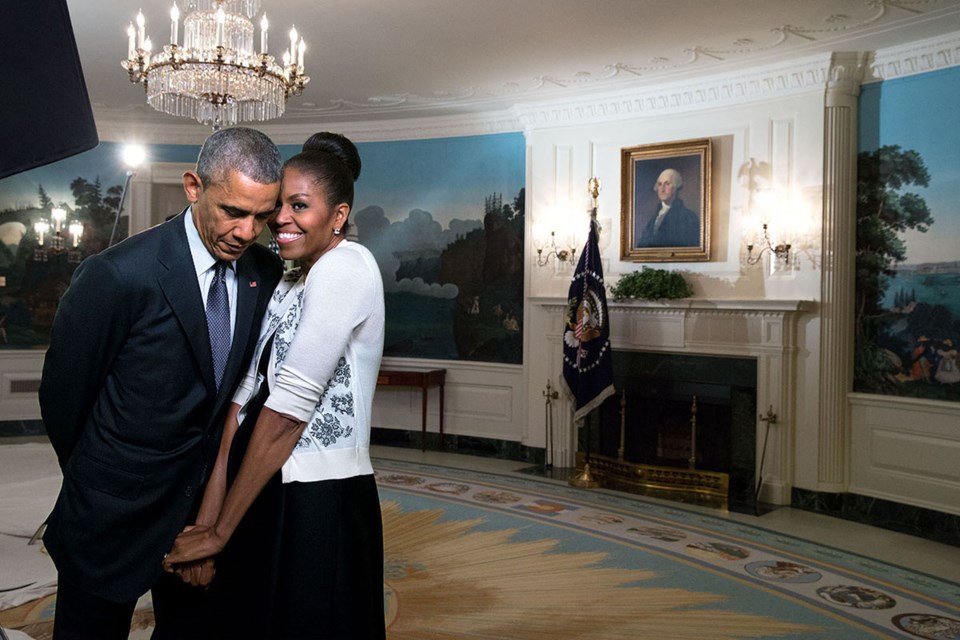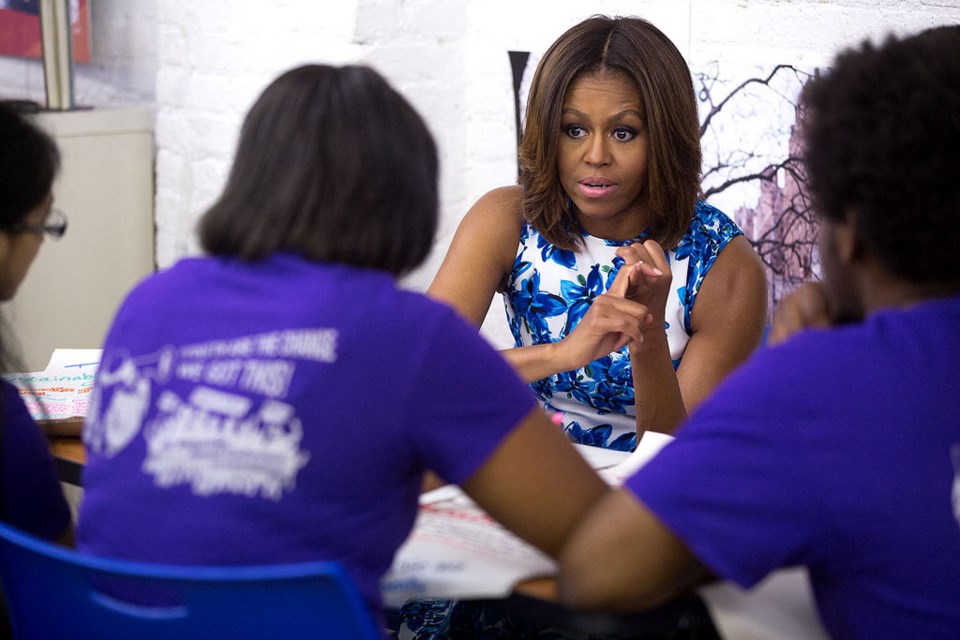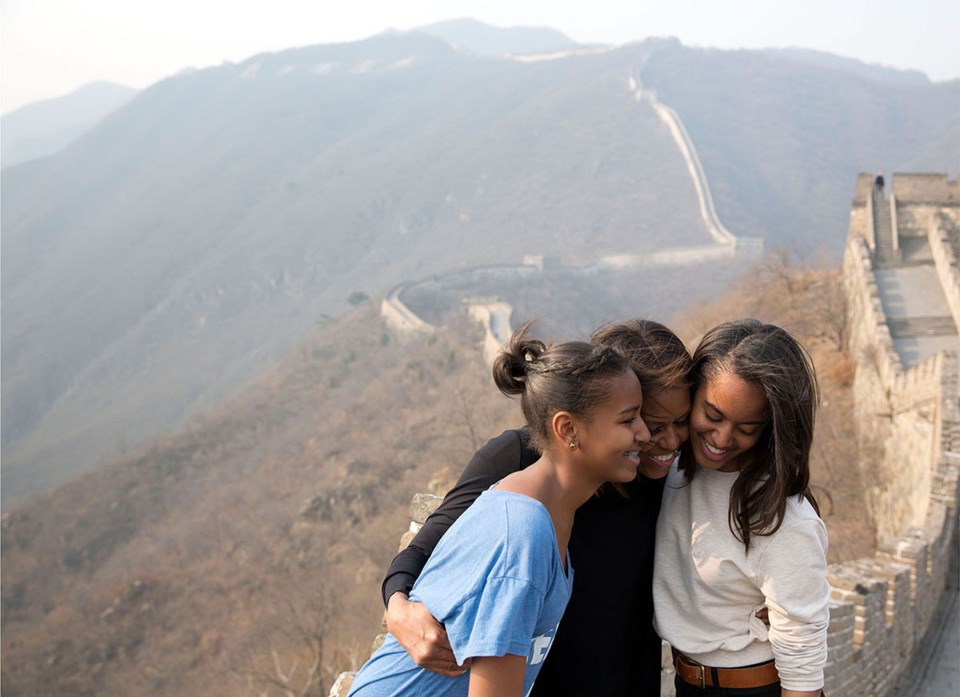Barack and Michelle Obama were already two very busy people before their lives were consumed by duties as president and first lady of the United States for eight years.
With two young children, the whole concept of work/life balance took on a whole new challenge.
When asked during Thursday afternoon’s visit to Vancouver how she managed to carve out a space for herself, as well as being a mother, Obama said she brought into her public life one very important rule: “You have to schedule the balance.”
“If we let life go, the first thing that fills it up is work. The job takes over,” she says.
Even when her daughters were toddlers and the Obamas were living in Chicago, it was too easy to give up her time to work demands.
“Your kids don’t have ‘people’,” she told the sold-out crowd at the Queen Elizabeth Theatre at her first of two presentations on Feb. 15 sponsored by the Greater Vancouver Board of Trade. Children don’t have someone to ask you to play with them or read a book in the same way that organizations have people to ask you to go to a conference or speak to a panel.
What she soon realized is that “I had to schedule my life first.”

Before she committed to anything as first lady, she met with her daughters’ teachers and wrote down all the special occasions such as school plays into her calendar. She also scheduled in exercises and time away with her girlfriends. She’d even schedule walks.
“Barack was in there, too,” she said with a smile.
What was left, she said, she gave to her (unpaid) job as first lady so that if someone asked her if she could do something on a particular day, there was no conflict. What she found is that when she said, “I’m sorry, that day doesn’t work for me,” most people simply accepted it and came up with alternatives.
“Put your family first,” she told the crowd which was about three-quarters women, one-quarter men. (Another former first lady, Hillary Clinton, had an even more overwhelmingly female audience when she was in Vancouver late December.)
Moderator Bridgitte Anderson, the general manager of Edelman Vancouver and the chair of the GVBOT’s Women’s Leadership Circle advisory committee, was intrigued by the importance that Obama placed on sustaining the friendships she had with girlfriends.
“I’m surprised I still have friends because of my boot camps,” Obama said of her retreats with girlfriends at Camp David. With a regime of three work-outs a day, low calorie counts and no wine, the weekends were a bit of a tough sell. “I did eventually have to put wine back on the menu,” she said. “And meat. Dessert once.”
She couldn’t — and still can’t — do all that she does without her “community of women,” including her mother, who moved into the White House with them. To accommodate this trip, her first to Vancouver, Obama had a girlfriend make sure that her daughter finished her research paper on time.
To the young women in the crowd — Vancity had sponsored tickets for 350 high school students from throughout the Lower Mainland — Obama said “It does not behoove us to see each other as competition. We support one another. I want you girls to start practising that now.”
One of the young women in the crowd, Yumi Mooney, an analyst with the Vancouver Fraser Port Authority and chair of GVBOT’s Company of Young Professionals advisory committee, asked Obama about the message young people are given that they can change the world. Then adulthood and work and family responsibilities set in, not leaving much time for such a momentous undertaking.
“I urge you to be patient with yourself,” Obama replied. “Sometimes the best way to save the world is right at home.”
Raise children who are thoughtful, kind and compassionate. Start with them, as well as mentoring other young people, and then once they get older and you have more time, you can spread your energies further afield.
“These limits [on your time] are real,” Obama said. In your early adult years, start thinking about what your passions are so that you can act when those limits are loosened. “You want to make sure you use the time when you’re not actually saving the world to figure out what you want to do. Be patient with yourself.”

Burnaby teenager Mandy Huynh, who is on the We for She advisory committee, asked Obama how she formed such a positive self-image.
“It’s practice,” Obama said. “Confidence is a muscle you have to work. It doesn’t just happen. You have to practise working through those bumps.”
There were times, she said, when she experienced failure, such as having her mind go blank when she was speaking to a crowd. “Those cold sweats really do happen,” she said. You have to put yourself in tough positions, know you can fail and then push through.
“You have to believe in the power of your own story,” she said. “The one thing I’ve always been proud of was who I was…. I was never ashamed of the journey.”
Her advice was “step out there, fail a lot. The more you fail, the more prepared you’ll be.”
She said that one of the reasons she chooses to be so candid is that “I want kids to know there is no magic” in being able to go from the south side of Chicago to the Whitehouse. “Hard work is required.”
She said that even though she could see only the shadows of the young people in the audience, she knew that they have what it takes to succeed. “The only things that can stop you are the doubts in your head and the negative comments you let inside. You’ve got to push through that and attract goodness into your life.”



